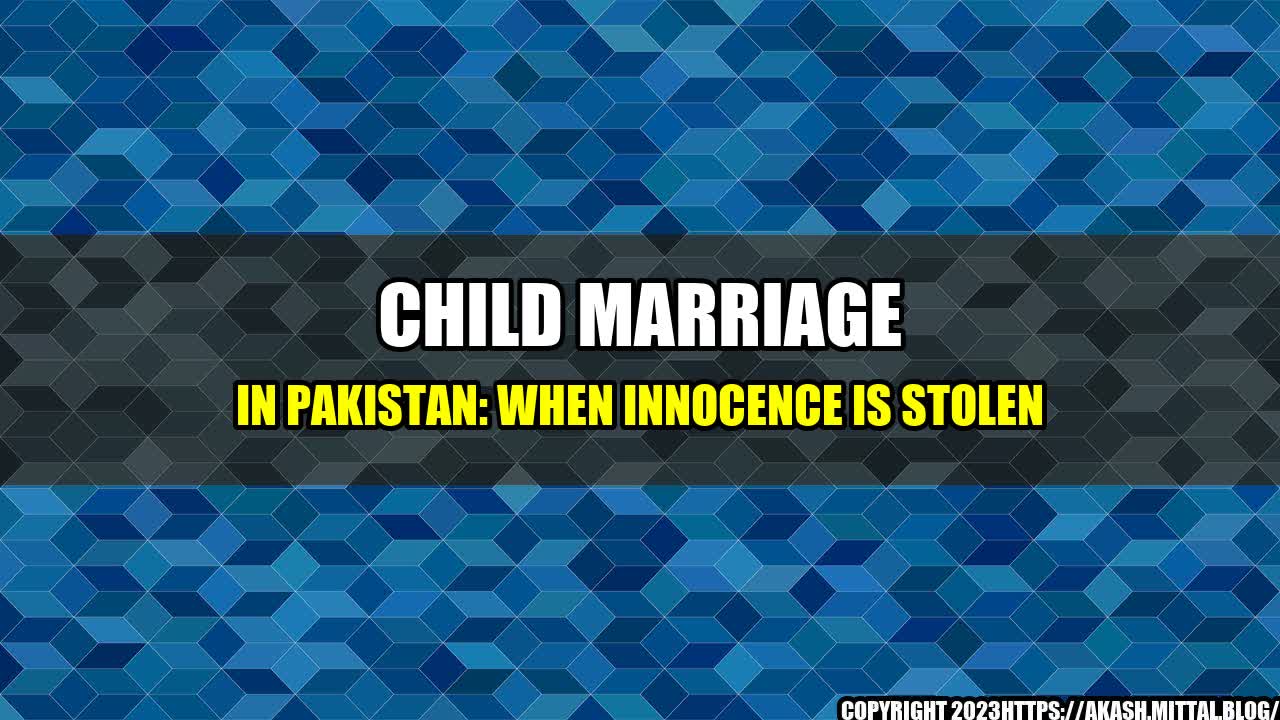"My name is Amina and I was married at the age of 9. I was playing with my friends when a man came and took me away. My parents were crying but they didn't stop him. I didn't understand what was happening until they took me to a room where a man was waiting for me. He was old and scary. They told me I had to marry him and be his wife. I didn't know what a wife was but I knew it wasn't something I wanted to be. I cried and begged them to let me go but they didn't listen to me. They forced me to convert to his religion and the next day they made me wear a red dress and take pictures with him. I felt sick and scared. I didn't want to look at him or touch him but they made me. I don't remember much of the wedding night but I remember feeling pain and bleeding. I didn't understand what was happening to me but I knew it was wrong. He was my husband and I was his wife but I didn't love him. I never will."

Amina's story is not unique. Every year, millions of girls are forced to marry before they turn 18. In Pakistan, the situation is particularly dire, as it has one of the highest rates of child marriage in the world. According to the United Nations Children's Fund (UNICEF), 21% of girls in Pakistan are married before the age of 18 and 3% before the age of 15. This means that roughly 1 in 5 girls in Pakistan will be married off as children, with devastating consequences for their health, education, and future prospects.
The Consequences of Child Marriage
Child marriage is not only a violation of human rights, but also a major obstacle to development and progress. When girls are married off as children, they are denied the right to education, freedom, and personal fulfillment. They are forced to drop out of school and assume adult roles and responsibilities for which they are not ready. They are also more likely to suffer from domestic violence, early pregnancy, and maternal mortality.
Research has shown that child marriage has a significant negative impact on a country's economy, as it perpetuates poverty and hinders social and economic progress. Women who marry as children are less likely to participate in the labor force and more likely to depend on their husbands for financial support, which limits their ability to contribute to their families, their communities, and their country's development.
The Catalysts of Child Marriage
The causes of child marriage are complex and interrelated, reflecting deep-rooted cultural, social, and economic factors. The practice is often motivated by poverty, insecurity, lack of education, traditional gender roles, and discriminatory laws and policies. At the same time, child marriage perpetuates these same factors, creating a vicious cycle that perpetuates poverty and inequality.
- Girls who marry as children are more likely to drop out of school and have limited access to education, which limits their opportunities and increases their vulnerability to poverty and exploitation.
- Girls who marry as children are more likely to suffer from domestic violence and physical and sexual abuse, which can have long-lasting physical and emotional consequences.
- Girls who marry as children are more likely to experience complications during pregnancy and childbirth, which can lead to maternal mortality and morbidity, as well as infant mortality and poor child health.
- Girls who marry as children are more likely to face discrimination and social exclusion, which limits their participation in public life and perpetuates gender inequality.
Breaking the Cycle of Child Marriage
Despite the challenges, progress is being made to prevent and address child marriage in Pakistan and around the world. Governments, civil society organizations, and community leaders are working together to raise awareness of the harmful effects of child marriage, enforce existing laws and policies, and promote gender equality and empowerment of girls and women.
Through education, access to health care, and economic opportunities, girls can break free from the cycle of poverty and inequality that perpetuates child marriage. By empowering girls and women, we can unlock the full potential of half of the world's population and build a better world for all.
Take Action Now: Join the Fight Against Child Marriage
If you want to help end child marriage in Pakistan and elsewhere, there are several things you can do:
- Inform yourself and others about the harmful effects of child marriage and the human rights violations it entails. Share information and resources with your friends, family, and community.
- Support organizations that work to prevent and respond to child marriage, such as UNICEF, Girls Not Brides, and Plan International. You can donate your time, money, or voice to these organizations and help them make a difference.
- Advocate for policy and legal reforms that protect the rights of girls and women and prevent child marriage. Write to your elected representatives and urge them to take action on this issue. Use social media and other platforms to raise your voice and demand change.

Curated by Team Akash.Mittal.Blog
Share on Twitter Share on LinkedIn